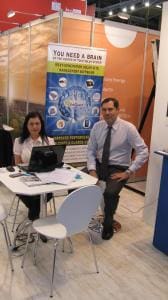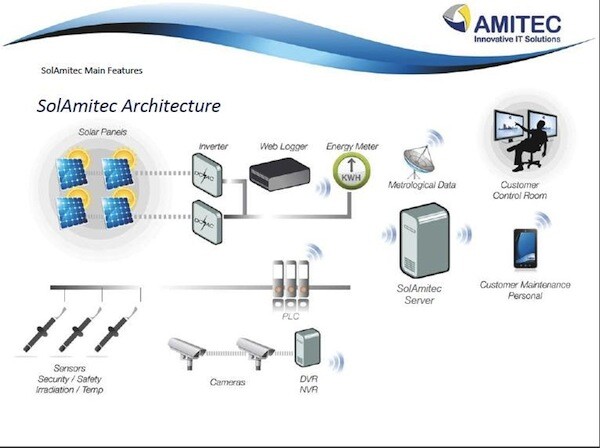SolAmitec (formerly SolGuard) is a comprehensive solar PV system performance monitoring and management solution that is compatible with a wide range of components that are already widely available and used in systems throughout the world–brand name inverters, weather sensors, security systems, and more. The SolAmitec software platform is a smart investment for both smaller, residential PV system owners, as well as commercial-scale solar power system operators who require a way to maximise the output of solar systems located at one or across multiple sites. SolAmitec not only monitors system production; it also provides rapid diagnostics and troubleshooting assistance.
Conventional output monitoring units for solar PV systems
Solar PV system owners and operators wanting to ensure a good return on investment (ROI) should be keenly interested in the ongoing performance of their system. A wide array of monitoring systems and equipment are available on the solar market; sometimes these come standard or as options in system inverters, sometimes as separate units. Generally speaking, these monitoring devices are able to show overall system output, but are not able to explain why a system may not be meeting expectations. Whilst better than having no clue about system performance until the power bill comes (as would be the case with no monitoring system at all), the limitation of knowing that something is wrong without knowing why can potentially be frustrating when trying to troubleshoot issues with your solar PV system.
SolAmitec: Policing the whole solar PV system

SolAmitec offers a unique, holistic means of ensuring optimal solar PV system output and ROI over the system’s lifetime–generally 25+ years–without the installation of new hardware. Instead, SolAmitec’s platform utilises, integrates and analyses the data from existing system hardware to give a bird’s eye view of system performance.
SolAmitec software platform overview:
–No need to purchase additional hardware: Existing monitoring, security, and safety equipment can be used with the SolAmitec software platform.
–SolAmitec is a cost-effective, unified solution for monitoring, analysing performance, detecting faults and managing repairs, undertaking preventative maintenance, ensuring site security and safety, and even managing the plant construction schedule (for larger systems). It is the only software that combines all of these functions in one single platform.

–Smart monitoring and analysis for the whole PV systems, as well as inverters and strings. Additionally, SolAmitec can also detect dust and shade, and faulty panels and strings, reducing the overall manpower and resources needed for system maintenance. Accurate data collection ensures rapid problem-solving capabilities.
–SolAmitec can integrate security and safety monitoring equipment such as CCT cameras and electrical sensors for the early detection of potential issues, ensuring quick response time by alerting the relevant people (by SMS or email) about potential threats such as theft, vandalism, electrical faults, and fire.
Is SolAmitec available in Australia?
SolAmitec developer Amitec, an Israel-based IT company founded in 1996, is currently looking to form partnerships with Australian solar system installers and commercial-scale solar power project developers. As such, SolAmitec is not yet commercially available here. If your company is interested in becoming a partner, please contact Amitec directly.

© 2012 Solar Choice Pty Ltd
- Solar Power Wagga Wagga, NSW – Compare outputs, returns and installers - 13 March, 2025
- Monocrystalline vs Polycrystalline Solar Panels: Busting Myths - 11 November, 2024
- Solar Hot Water System: Everything You Need to Know - 27 February, 2024
Have been scouring the net for monitoring a domestic system with a Macsolar inverter that functions on a Mac OSX platform. This aspect of the solar story appears to be playing catch up with actual installations… anyone had success?